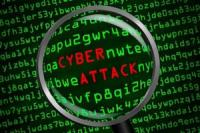-
Russia has been cyber-attacking “U.K. media, telecommunications, and energy sectors”: U.K. cybersecurity chief

Ciaran Martin, CEO of the U.K. National Cyber Security Center (NCSC): “I can confirm that Russian interference, seen by the National Cyber Security Center, has included attacks on the U.K. media, telecommunications and energy sectors. That is clearly a cause for concern — Russia is seeking to undermine the international system.”
-
-
Developing autonomous drone swarms for urban warfare
DoD has awarded a team of researchers $7.1 million to develop a drone swarm infrastructure to help the U.S. military in urban combat. The goal is to develop a technology which would allow troops to control scores of unmanned air and ground vehicles at a time.
-
-
"Kompromat": Russian agents offered to send women to Trump's hotel room in 2013
Keith Schiller, who had served for many years as Donald Trump’s personal body guard and who later became director of Oval Office relations – a post he left last month – told a congressional panel that when Trump was in Moscow to attend the Miss Universe Pageant, Russian operatives offered to send five attractive women to his hotel room to spend the night. Christopher Steele, a respected former MI6 agent in Russia who put together the memos which came to be known as the Steele Dossier, quoted Russian sources referring to secretly recorded tapes which captured Trump and some of the women engaged in unorthodox sexual activities. The U.S. intelligence community has confirmed most of the contents in the dossier, but the existence of the tapes is one of the few topics in the dossier which remains shrouded in mystery.
-
-
Extremist content and Russian disinformation online: Working with tech to find solutions
“It’s been more than a year since my colleagues and I described in writing how the Russian disinformation system attacked our American democracy. We’ve all learned considerably more since then about the Kremlin’s campaigns, witnessed their move to France and Germany and now watch as the world worst regimes duplicate their methods. Yet our country remains stalled in observation, halted by deliberation and with each day more divided by manipulative forces coming from afar. The U.S. government, social media companies, and democracies around the world don’t have any more time to wait. In conclusion, civil wars don’t start with gunshots, they start with words. America’s war with itself has already begun. We all must act now on the social media battlefield to quell information rebellions that can quickly lead to violent confrontations and easily transform us into the Divided States of America.”
-
-
Why some Muslim clerics become jihadists
What turns people into radical jihadist clerics? A new book offers a new answer: thwarted career ambitions. More specifically, the book — Deadly Clerics: Blocked Ambition and the Paths to Jihad by MIT political scientist Richard Nielsen —finds that a certain portion of Muslim clerics who end up advocating for jihad, that is, war against Islam’s foes, started out as mainstream clerics looking for state-sponsored jobs where they could use their intellectual training, only to become unemployed, disenchanted, and radicalized.
-
-
Russia’s pro-Trump campaign began early, aiming to help him win GOP primaries: WSJ
The U.S. intelligence community cited December 2015 as the earliest suspected time that Russian government social media account began their broad campaign in support of Donald Trump. A Wall Street Journal investigation reveals that the Kremlin’s campaign of support for Trump began six months earlier, in June 2015, days after he announced his candidacy. This earlier Russian disinformation campaign was aimed to help Trump defeat his Republican primary rivals. This early campaign, however, already engaged in dissemination of fake stories aiming to tarnish Hillary Clinton and undermine her campaign.
-
-
Cost of War on Terror since 9/11: $5.6 trillion

As of late September 2017, the United States wars in Iraq, Afghanistan, Pakistan, and Syria and the additional spending on Homeland Security, and the Departments of Defense and Veterans Affairs since the 9/11 attacks totaled more than $4.3 trillion in current dollars. Adding likely costs for FY2018 and estimated future spending on veterans, the costs of war total more than $5.6 trillion. Over 6,800 U.S. soldiers have died in the wars.
-
-
At least 26 dead after worst mass shooting in Texas history at San Antonio-area church
A lone gunman killed at least 26 people and injured many more at a church in Sutherland Springs. The tiny town was left reeling from the deadliest shooting at a place of worship in American history. The victims ranged in age from 5 to 72. The gunman has since been identified as 26-year old Devin Patrick Kelley. Kelley served in the Air Force and was court-martialed in 2012 for assaulting his spouse and their child. He received a bad conduct discharge, 12 months’ confinement, and a reduction in rank.
-
-
Nuclear energy programs do not increase likelihood of nuclear weapons proliferation: Study

Contrary to popular thought, nuclear proliferation is not more likely to occur among countries with nuclear energy programs, according to new research. In a historical analysis of the relationship between nuclear energy programs and proliferation from 1954 to 2000, the study finds that the link between the two has been overstated. “The findings suggest that international efforts to manage the proliferation risks of nuclear energy programs have been quite effective,” says the study’s author. “Even when countries become more technically capable of developing nuclear weapons due to an energy program, they can often be restrained by timely intelligence and the prospect of sanctions.”
-
-
DOJ considering charging Russian government officials in DNC, Podesta hacks
The Department of Justice has identified six Russian government officials involved in hacking the DNC and using the information against candidate Hillary Clinton during the 2016 election. Prosecutors have enough evidence to bring charges against those individuals by next year. The information gathered by DOJ supports the U.S. intelligence community’s conclusion that Russian President Vladimir Putin ordered Russian government agencies to launch a coordinated effort to help Trump win the November election. DOJ has identified Russian hackers working for both military and intelligence agencies in Russia.
-
-
The Halloween terror attack in New York: The threat from foreign-born terrorists
From 1975 through 31 October 2017, the annual chance of being murdered in a terror attack on U.S. soil committed by a foreign-born person stands at 1 in 3,808,094 per year. In all, 3,037 people have been murdered on U.S. soil by 182 foreign-born terrorists from 1975 through 31 October 2017 (this figure includes the nearly 3,000 killed on 9/11). Of those 182 foreign-born terrorists, 63 initially entered with green cards. Including Tuesday’s attack, those who entered on a green card killed 16 people, or about 0.53 percent of all people murdered in terror attacks on U.S. soil committed by a foreigner. If the number of injuries in Tuesday’s attack stays at 12, terrorists who entered on green cards have injured about 203 people during this period in attacks.
-
-
Newly released Bin Laden papers confirm Iran, Al Qaeda allied as enemies of America
The CIA has released thousands of documents and other files recovered from Osama bin Laden’s compound in Pakistan, when the terrorist leader was killed, providing “invaluable insights” into the terror group’s operations, and confirming previous reporting on its ties to Iran. Though ties between al-Qaeda, the Sunni terrorist organization, and Iran, the Shiite nation that has been designated by the United States State Department as “foremost state sponsor of terrorism,” have been reported for a while now, they have often been discounted due to their diverging religious philosophies.
-
-
Protecting major sport venues
Three major sporting leagues — the National Football League (NFL), Major League Baseball (MLB), and National Basketball League (NBA) — have played a key role in significantly upgrading and strengthening security at stadiums and arenas throughout the country with the help of the Department of Homeland Security Science and Technology Directorate’s SAFETY Act. The Support Anti-Terrorism by Fostering Effective Technologies (SAFETY) Act incentivizes private sector investment in protecting the nation’s critical infrastructure and the public by providing liability risk mitigation and litigation tools for claims that stem from or relate to an act of terrorism where a SAFETY Act covered technology (called a qualified anti-terrorism technology) is used.
-
-
Email writer’s identity can be revealed by analyzing small sequences of words
Researchers examined thousands of emails to show it is possible to identify someone by analyzing small sequences of words and prove them as the author. The research aims to address the challenges experts face when analyzing language evidence in court proceedings or in reports.
-
-
U.S. shouldn’t give up benefits of ‘green card lottery’ over low risk of terrorism
After a man barreled down a New York City bike path on Oct. 31, killing eight, President Donald Trump reacted by calling for an end to the “green card lottery” program that allowed the attacker to enter the country. As someone who researches the impact of immigration on workers, I believe their plans to change who can enter the country legally is a big mistake. We would be giving up a program that benefits American workers with very little chance of a gain in safety. Immigration that emphasizes diversity, rather than merely merit, tends to attract more people who specialize in occupations uncommon among U.S.-born workers. And, in fact, this is the key source of the well-known economic benefits of immigration. Studies show this tendency toward job specialization is a key reason the large volume of low-skill immigration does not drive down incomes of Americans. Other research shows that simply encouraging immigration from diverse origins lifts wages. Put differently, there is direct evidence that the sort of diversity that the green card lottery encourages makes all Americans better off. It would be a shame to give all of that up because of a tiny risk of terrorism.
-
More headlines
The long view
Factories First: Winning the Drone War Before It Starts
Wars are won by factories before they are won on the battlefield,Martin C. Feldmann writes, noting that the United States lacks the manufacturing depth for the coming drone age. Rectifying this situation “will take far more than procurement tweaks,” Feldmann writes. “It demands a national-level, wartime-scale industrial mobilization.”
No Nation Is an Island: The Dangers of Modern U.S. Isolationism
The resurgence of isolationist sentiment in American politics is understandable but misguided. While the desire to refocus on domestic renewal is justified, retreating from the world will not bring the security, prosperity, or sovereignty that its proponents promise. On the contrary, it invites instability, diminishes U.S. influence, and erodes the democratic order the U.S. helped forge.
Fragmented by Design: USAID’s Dismantling and the Future of American Foreign Aid
The Trump administration launched an aggressive restructuring of U.S. foreign aid, effectively dismantling the United States Agency for International Development (USAID). The humanitarian and geopolitical fallout of the demise of USAID includes shuttered clinics, destroyed food aid, and China’s growing influence in the global south. This new era of American soft power will determine how, and whether, the U.S. continues to lead in global development.
Water Wars: A Historic Agreement Between Mexico and US Is Ramping Up Border Tension
As climate change drives rising temperatures and changes in rainfall, Mexico and the US are in the middle of a conflict over water, putting an additional strain on their relationship. Partly due to constant droughts, Mexico has struggled to maintain its water deliveries for much of the last 25 years, deliveries to which it is obligated by a 1944 water-sharing agreement between the two countries.
How Disastrous Was the Trump-Putin Meeting?
In Alaska, Trump got played by Putin. Therefore, Steven Pifer writes, the European leaders and Zelensky have to “diplomatically offer suggestions to walk Trump back from a position that he does not appear to understand would be bad for Ukraine, bad for Europe, and bad for American interests. And they have to do so without setting off an explosion that could disrupt U.S.-Ukrainian and U.S.-European relations—all to the delight of Putin and the Kremlin.”
How Male Grievance Fuels Radicalization and Extremist Violence
Social extremism is evolving in reach and form. While traditional racial supremacy ideologies remain, contemporary movements are now often fueled by something more personal and emotionally resonant: male grievance.
